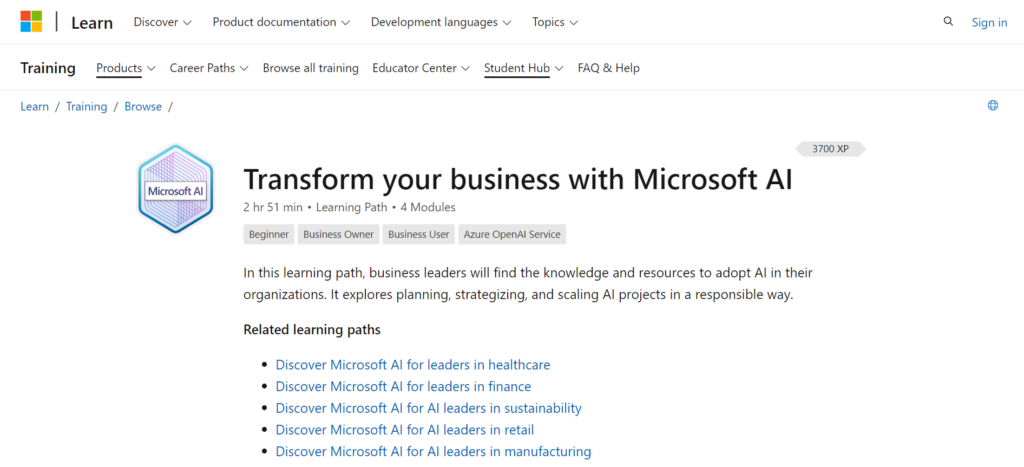Speed and adaptability are increasingly crucial, and emerging technologies play a vital role in business scalability. Missing this trend can mean falling far behind the competition. We will explore together how automation, artificial intelligence (as you might have guessed!), and cloud computing are transforming business strategies, enabling sustainable and scalable growth.
Artificial Intelligence: The game changer?
Artificial Intelligence (AI) refers to systems capable of simulating human intelligence to perform tasks such as data analysis, customer service, and product personalization.
Currently, generative AI (e.g., ChatGPT) is particularly popular and deservedly so in many areas. However, it’s essential not to overlook other AI technologies such as Machine Learning, NLP, and expert systems.
In the business world, AI enhances scalability by optimizing decision-making and automating operations, thus enabling large-scale personalization. For example, Amazon uses AI algorithms to recommend products tailored to customer preferences, while Netflix customizes content suggestions for its users. These companies have successfully scaled by integrating AI into their strategies, providing real added value to customers.
AI can assist small businesses by boosting prospecting, improving customer service, managing inventory, and optimizing lead capture. For example, AI-driven tools can dynamically adjust landing page content and design to align with specific audience segments, improving conversion rates. These areas typically require resources that small businesses might not have, and AI can help bridge that gap. By studying successful landing page examples, businesses can better understand which elements to optimize and how AI can further enhance performance. In addition, using an AI detector can ensure that the content created or managed is original and not AI-generated, which is becoming increasingly important in many sectors.
To take full advantage of what AI can offer, one must first be aware of its potential benefits. For this, don’t hesitate to utilize the free resources available. For instance, on LinkedIn, there are numerous AI professionals who offer mini-courses and explain the possibilities AI provides (this will give you an idea of what AI can do for you).

Even the big tech companies (GAFAM) offer free training programs. Don’t hesitate to explore what they offer! For example, Microsoft provides a training path for business leaders: Transform Your Business with Microsoft AI.
As businesses scale with AI and automation, ensuring content and code authenticity becomes increasingly critical. Tools like the AI source code detector help verify whether code or technical documentation has been AI-generated, supporting transparency and trust in fast-moving digital environments.
Automation: Optimizing processes and reducing costs
Automation allows for increased production with fewer resources, which is essential when scaling a business, especially given the difficulty of finding new talent to join the team. If you are considering assembling a development team, LATAM nearshoring might be a great option. Optimizing processes reduces costs and frees up human resources, enabling employees to focus on higher-value activities. For employees, there is also the benefit of being relieved from repetitive and often uninteresting tasks.
In the services sector, automation increasingly leverages AI! Marketing automation using software to manage emails and campaigns optimizes targeted and effective communication with customers. By integrating artificial intelligence, businesses can personalize content, precisely segment contacts, and predict purchase intentions, which increases conversion rates and customer loyalty.
In addition to optimizing processes to reduce costs, your organization can go for energy comparison practices to find the best possible utility price deal in your locality.
While businesses are continuously adapting to technological changes, it’s also crucial to consider economic statistics, such as those found in retirement planning. Understanding retirement statistics about saving can offer valuable insights into financial planning for both individuals and organizations. These statistics highlight the importance of informed decision-making in the face of changing demographic trends.
Cloud computing: Flexibility and scalability
Cloud computing, with its IaaS, PaaS, and SaaS services, offers crucial flexibility and scalability for small businesses. By reducing infrastructure costs and enabling rapid adaptation to demand, the cloud helps these businesses maximize their limited resources. The cloud enables analyzing vast datasets easily, thanks to its scalability, a task that would be significantly more challenging with on-premise solutions. Examples like Airbnb and Dropbox illustrate how the cloud can catalyze growth and efficiency, even for small organizations with limited budgets.
The leading cloud providers, AWS and Azure, need no introduction. And since I am French, I will also mention OVH.
Templates: Freeing up resources
Templates have the advantage of being quickly implemented without requiring specialized skills in the field. They help free up resources, which is essential for small businesses that want to scale. These templates allow for a good level of quality at a lower cost.
Here are a few examples:
- Invoice Template: Accounting platforms to handle invoicing and payments seamlessly can be complemented by using an Invoice Template for MS Word, offering flexibility and ease of customization.
- Social Media Templates: Create professional-quality posts without needing to hire a designer.
- Cash invoice receipt template: These templates reduce the risk of errors, especially when working across multiple countries and currencies. Working in retail, I know how different the laws can be between countries…
- Pay Stub Templates: Simplify payroll management and maintain accurate employee records. Pay stub templates make it easy to generate consistent, professional pay documents while saving time and minimizing mistakes.
Conclusion
In conclusion, the adoption of technologies such as cloud computing, artificial intelligence, and automation is crucial for business scalability. These areas are not passing trends; to avoid being left behind, businesses must embrace them.These innovations provide effective solutions to optimize operations, reduce costs, and foster agile growth.










Leave a Reply